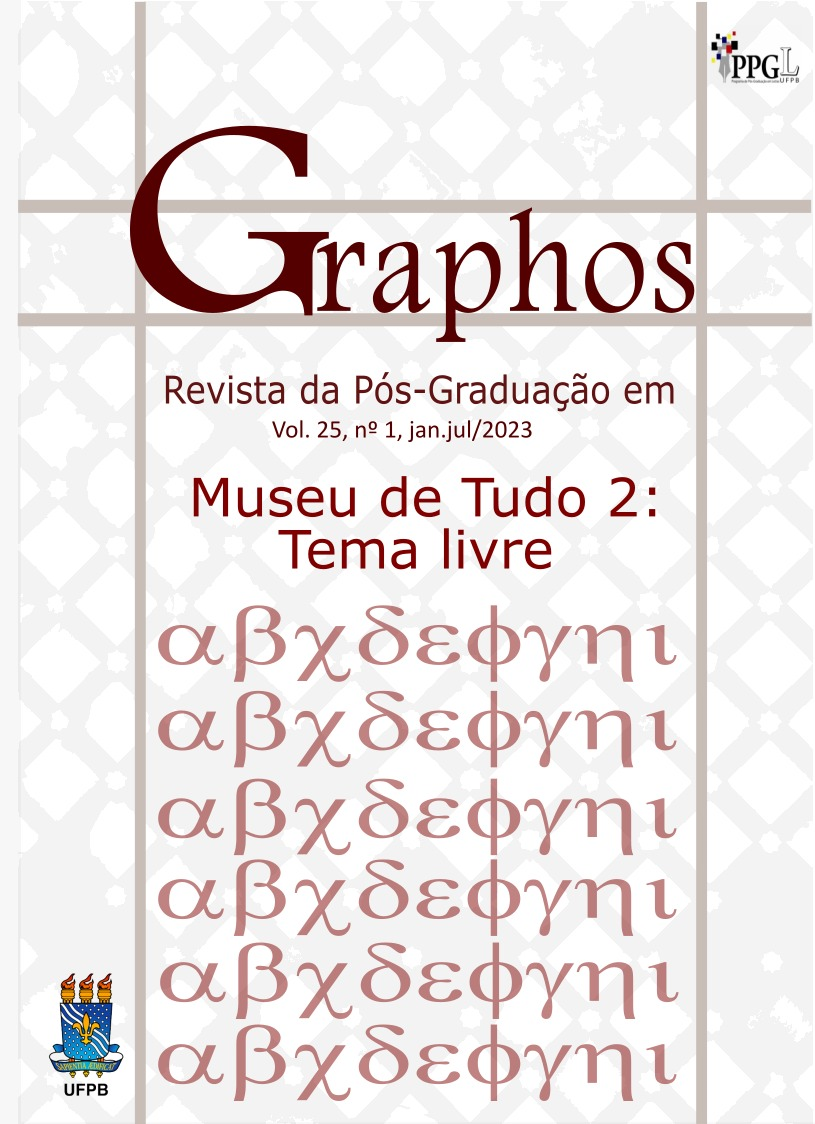STORYTELLING IN LITERATURE TEACHING:
A SOCIO-INTERATIVE PERSPECTIVE
DOI:
https://doi.org/10.22478/ufpb.1516-1536.2023v25n1.64558Keywords:
Literature of the oral tradition; storytelling; literary reader training; teaching practices; sociointeracionism.Abstract
In this paper, we present the results and analysis of a research with a group of teachers and high school students in the city of Tapiramutá/Bahia. With it, we aimed to understand the contributions of storytelling activities performed by traditional storytellers, guided by the socialinteractionist perspective of language, for the formation of literary readers, based on the following questions: how can literature of the oral tradition enable the proposition of teaching practices based on the socialinteractionist perspective? What are the contributions of storytelling to the formation of literary readers? We start from the understanding of the importance of including oral tradition literature in the curriculum as teaching content, from a socialinteractionist perspective, aiming at making public and visible the culture of the speakers of a given discourse community, narrated from oral genres. The methodology is qualitative in nature, under the foundations of action research, through proposed activities involving a collaborative network that jointly planned and developed activities composed of the promotion of didactic sequences and reading activities, interpretation, illustration, and re-reading of literary texts from the oral tradition. We took as our theoretical path the perspectives of Marcuschi (2008; 2010), Bakhtin (2007; 2015; 2017) and Gumperz (1982). We verified that the literary reading activities and practices developed followed methodologies guided by the reflection of the concrete historical, social and cultural contexts of the students and were based on the following perspectives: in the social interactionist theory, in the BNCC - Common National Curricular Base - and in literary literacy.
Downloads
References
BAKHTIN, Mikhail. A cultura popular na Idade Média e no Renascimento: o contexto de François Rabelais. 4. ed. Tradução de Yara Frateschi. São Paulo: HUCITEC; Brasília: Editora da Universidade de Brasília, 1999.
BAKHTIN, Mikhail. Estética da criação verbal. 4. ed. Tradução de Paulo Bezerra. São Paulo: Martins Fontes, 2007.
BAKHTIN, Mikhail. Notas sobre literatura, cultura e ciências humanas. Organização, tradução, posfácio e notas de glossário de Paulo Bezerra. São Paulo: Editora 34, 2017.
BAKHTIN, Mikhail. A teoria do romance I – A estilística. Tradução, prefácio, notas de glossário de Paulo Bezerra. São Paulo: Editora 34, 2015.
BRASIL. Ministério da Educação. Base Nacional Comum Curricular. Brasília: MEC, 2018.
BRASIL, Ministério da Educação. Parâmetros Curriculares Nacionais para o Ensino Fundamental. Brasília: MEC/SEF, 1997.
BRASIL, Ministério da Educação. Parâmetros Curriculares Nacionais para o Ensino Médio. Brasília: MEC/SEF, 2000.
BRONKART, Jean Paul. Atividades de linguagem, textos e discursos. São Paulo: PUC SP, 1999.
COSSON, Rildo. Letramento literário: educação para vida. Vida e Educação, Fortaleza, v. 10, 2006.
ECO, Umberto. Semiótica e filosofia da linguagem. São Paulo, 1991.
ELIA, Marcos Fonseca; SAMPAIO, Fábio Ferrentini. Plataforma Interativa para Internet: uma proposta de Pesquisa-Ação a Distância para professores. Anais do XII Simpósio Brasileiro de Informática na Educação, 102-109, 2001. Acesso em: 13 jun. 2021.
DERRIDA, Jacques. A escritura e a diferença. São Paulo: Perspectiva, 1971.
FIORIN, José Luiz. O dialogismo. In: FIORIN, José Luiz. Introdução ao pensamento de Bakhtin. São Paulo: Ática, 2006, p.18-59.
FREIRE, Paulo. A importância do ato de ler: em três artigos que se completam. São Paulo: Cortez, 1989.
GUMPERZ, Jonh Joseph. Discourse Strategies. Cambridge: Cambridge University Press, 1982. DOI: https://doi.org/10.1017/CBO9780511611834
KLEIMAN, Angela Bustos. O que é literatura. São Paulo: Brasiliense, 1981.
KLEIMAN, Angela Bustos. Os significados do letramento. Uma nova perspectiva sobre a prática social da escrita. Campinas: Mercado de Letras, 1995.
MARCUSCHI, Luiz Antônio. Da fala para a escrita: atividades de retextualização. 10 ed. São Paulo: Cortez, 2010.
MARCUSCHI, Luiz Antônio. Produção textual, análise de gêneros e compreensão. São Paulo: Parábola, 2008.
MATOS, Gislayne Avelar. A palavra do contador de histórias: sua dimensão educativa na contemporaneidade. São Paulo: Martins Fontes, 2005.
MEDVIÉDEV, Pável Nikoláievitch. O método formal nos estudos literários: Introdução crítica a uma poética sociológica. Tradução de Sheila Camargo Grillo e Ekaterina Vólkova Américo. 1. ed. São Paulo: Contexto, 2019.
MELLO, Cláudio José de Almeida. Contribuições do Comparativismo para a Formação de Professores Mediadores e a Promoção da Leitura Literária. Revista Brasileira de Literatura Comparada, v. 22, p. 89-113, 2003.
MINAYO, Maria Cecília. Pesquisa social, teoria, método e criatividade. In: MINAYO, Maria Cecília. Capítulo 3: Trabalho de campo: contexto de observação, interação e descoberta. Petrópolis, RJ: Editora Vozes, 2009.
SOARES, Magda. Letramento: um tema em três gêneros. Belo Horizonte: Autêntica, 1998.
VOLÓCHINOV, Valentin. Marxismo e Filosofia da Linguagem. Organização, tradução, ensaio introdutório e notas de Sheila Grillo e Ekaterina Vólkova Américo. São Paulo: Editora 34, 2019.
VOLÓCHINOV, Valentin. A Palavra na vida e a palavra na poesia. Problemas fundamentais do método sociológico na ciência da linguagem. Tradução de Sheila Grillo e Ekaterina Vólkova Américo. São Paulo: Editora 34, 2021.
VYGOTSKY, Lev Semionovitch. Pensamento e linguagem. 3. ed. São Paulo: Martins Fontes, 1991.
ZUMTHOR, Paul. Escritura e Nomadismo: Entrevistas e Ensaios. Tradução de Jerusa Pires Ferreira e Sonia Queiroz. São Paulo: Ateliê Editorial, 2005.
ZUMTHOR, Paul. Performance, recepção, leitura. Tradução de Jerusa Pires Ferreira e Suely Fenerich. São Paulo: Cosac Naify, 2007.
Downloads
Published
Issue
Section
License
Copyright (c) 2023 Marineide Cavalcanti Arruda, Nádia Barros de Araújo, André Luís de Araújo, Ana Paula Torres de Queiroz

This work is licensed under a Creative Commons Attribution 4.0 International License.







